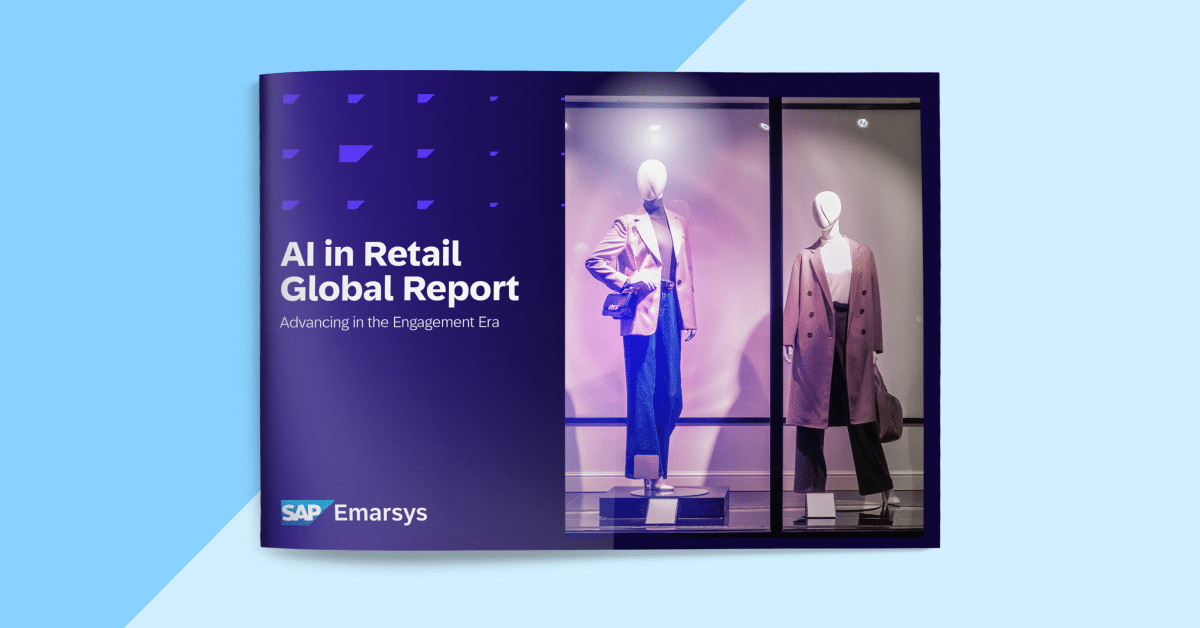AI is no longer an experiment in retail. From personalizing campaigns in real time to automating complex journeys and unlocking deeper insights, AI is giving marketers the tools to move faster and act smarter, and deliver the meaningful experiences that their customers demand.
But where is AI making the biggest impact right now, and how are leading retail brands using it to drive measurable results?
Our latest research answers these questions. In this article, we’ve pulled together 20 retail-specific statistics from the SAP Engagement Cloud AI in Retail report, a global benchmark study exploring how AI is shaping marketing strategy, execution, and performance in 2025. Use these insights to see where you stand, spot untapped opportunities, and take your next step with confidence.
Dive Deeper: Want to learn how marketers in your region are leveraging AI and what consumers think about the impact of AI on their experience? Check out these infographics, which feature five common themes across:
We also have a global version here.
AI Investment and Adoption in Retail
Retail moves fast, and shoppers expect brands to keep up. From search to checkout, every interaction needs to feel relevant, seamless, and personal. That’s why so many retail marketers are turning to AI to help them meet rising expectations without overloading their teams. These stats show how AI is powering real impact across the retail journey.
92% of retail marketers are using AI in 2025 [SAP Engagement Cloud]
AI has become a foundational part of modern retail marketing. For many brands, AI is the infrastructure that supports speed, scale, and smart decision-making. With usage this widespread, the conversation has shifted from “should we use AI?” to “how can we use it better?”
55% of US retail marketers plan to increase their AI investment to boost customer engagement in 2025 [SAP Engagement Cloud]
With growing pressure to improve efficiency and reduce costs, AI is one of the few investments that pays off in both speed and results. Whether it’s campaign automation, performance optimization, or real-time personalization, marketers are directing more budget toward tools that deliver measurable impact. This stat reflects growing confidence in AI’s business case.

Only 39% of marketers are using AI to create new experiences for customers [SAP Engagement Cloud]
While many retailers have adopted AI for personalization and automation, fewer are pushing the boundaries of what AI can actually do. Creating new, innovative experiences, not just optimizing existing ones, is where the real competitive advantage lies. This stat shows there’s a huge opportunity for brands willing to experiment beyond the basics.
Personalization, Performance, and Productivity in Retail
From improving targeting to scaling content delivery, retail marketers are using AI to close the gap between what customers expect and what they can deliver. These stats show how AI is driving more meaningful experiences while helping retail marketing teams work smarter.
53% of US marketers believe AI is essential for fully leveraging their customer data to achieve business goals [SAP Engagement Cloud]
Retailers are sitting on more customer data than ever, but without AI, much of it goes unused. This stat shows that over half of marketers now see AI not just as helpful, but as critical to turning raw data into strategic action. Whether it’s segmentation, automation, or attribution, AI helps unlock the full potential of every data point.

79% of retail marketers use AI to personalize content and campaigns [SAP Engagement Cloud]
Personalization has moved far beyond first-name fields. With AI, retail marketers can tailor product recommendations, content, and messaging based on live customer data, not just past purchases. This level of relevance builds stronger connections, drives more conversions, and makes every touchpoint feel intentional. It’s one of the clearest ways AI is improving the shopper experience.
70% of retail marketers use AI to optimize campaign performance in real time [SAP Engagement Cloud]
Retailers no longer have to wait for end-of-week reports to make decisions. AI tools can monitor live performance signals and adjust everything from subject lines to send times while the campaign is still running. This flexibility helps maximise budget efficiency and makes it easier to hit goals, especially during high-stakes trading periods like Black Friday or peak sale events.
58% of retail marketers report increased customer loyalty through AI [SAP Engagement Cloud]
While powerful for acquisition, AI’s true value shines with retention, surfacing the right offers, moments, or messages to keep customers coming back. For brands with long buying cycles or high-value repeat customers, that’s a major win.
66% of retail marketers use AI to predict future consumer behavior [SAP Engagement Cloud]
Whether it’s making a repeat purchase or dropping off entirely, anticipating what a shopper will do next is a powerful advantage. AI enables retail marketers to act on behavioral signals in real time, tailoring journeys that feel proactive rather than reactive. From churn prevention to loyalty-building, predictive models are helping teams engage smarter and earlier.
42% of US shoppers would support brands bringing more AI into the buying experience [SAP Engagement Cloud]
Consumers are open to AI, as long as it improves convenience, personalization, or speed. This stat suggests there’s room for retailers to expand AI use, as long as the benefit to the shopper is clear. The key is applying AI in ways that feel helpful, not invasive, and always prioritising transparency and trust.

71% say AI helps them launch marketing campaigns faster, saving an average of 2.3 hours per campaign [SAP Engagement Cloud]
AI streamlines campaign workflows from end to end. Whether it’s generating copy, building segments, or choosing optimal channels, automation removes hours of manual work. That saved time adds up fast, especially for lean teams managing multiple product lines or regions. Faster execution means more time to focus on creative strategy and experimentation.
72% say AI frees their team to focus on more creative work by reducing repetitive tasks [SAP Engagement Cloud]
Marketers don’t want to spend their time pulling lists or formatting reports. AI takes care of those repetitive, time-consuming tasks, giving teams more space to think strategically and deliver original ideas. For brands that value agility and creativity, this shift in focus is helping unlock better work and faster results.
60% of retail marketers report increased customer engagement through AI [SAP Engagement Cloud]
By making communications more relevant, timely, and personalized, retailers are seeing higher engagement across channels. Emails are opened more, clicks increase, and conversion rates improve. It’s proof that smarter marketing doesn’t have to mean more complexity for the customer.
47% of US retail marketers report increased customer loyalty through AI [SAP Engagement Cloud]
AI helps retailers identify key moments in the customer journey where a small nudge can drive long-term value. From win-back emails to loyalty incentives and perfectly-timed reminders, these interventions build trust and habit. As a result, brands are seeing stronger repeat business and longer customer lifecycles.

Consumer Expectations and Retail Outcomes
Marketers may be fully invested in AI, but many consumers are still catching up. While some recognise the benefits it brings to speed, convenience, and relevance, others remain unsure about its role in the retail experience.
These stats paint a nuanced picture. There is still a trust gap around data and privacy, and many shoppers are unclear about how AI actually influences their journeys. At the same time, positive experiences are growing, especially when AI is used thoughtfully and transparently. The takeaway for retailers is simple: AI works best when customers can see the value and feel in control.
Only 17% of consumers think AI is having a negative impact on their retail experiences. [SAP Engagement Cloud]
Despite concerns about privacy or automation, most shoppers aren’t reacting negatively to AI. In fact, the majority don’t see it as harmful at all. This opens the door for retailers to expand their use of AI confidently, as long as they stay transparent and focused on customer benefit. Done well, AI can enhance the experience without alienating the customer.
33% of US shoppers report a positive impact of AI on their retail experience [SAP Engagement Cloud]
While retailers are embracing AI at scale, consumer perception is still catching up. Just a third of shoppers feel AI is making their experience noticeably better, a signal that more education, clarity, and real value is needed.

69% of consumers are satisfied with AI-powered product recommendations [SAP Engagement Cloud]
When AI gets it right, shoppers notice. Smart product recommendations help customers discover relevant items faster, whether they’re browsing online or opening an email. This kind of convenience improves the customer experience, boosts conversion and average order value. For retailers, it’s one of the clearest ways AI can deliver value to both sides.
55% of consumers say AI makes shopping easier, and 53% say it makes it faster [SAP Engagement Cloud]
Ease and speed are two of the biggest drivers of customer satisfaction in retail. AI is making that possible by improving site search, personalizing offers, and streamlining the checkout process. When shoppers can find what they want quickly and effortlessly, they’re more likely to complete their purchase – and come back for more.
55% of US marketers believe they offer consumers enough value in exchange for their data [SAP Engagement Cloud]
More than half of marketers are confident they’re providing fair value for the personal data they collect, but that doesn’t always align with how shoppers feel. With rising concern around data privacy and AI, brands must not only deliver value, but communicate it clearly. Earning trust is just as important as earning clicks.

25% of consumers say retailers should use AI to make shopping more personal — but only 29% feel they receive enough value in return for their data [SAP Engagement Cloud]
There’s a clear opportunity here, but also a gap in perception. Shoppers want more personalized experiences, but many don’t believe they’re getting a fair value exchange. This highlights the importance of transparency: if brands want to earn trust, they need to show how data is used and ensure AI outputs feel genuinely useful and relevant.
63% of global consumers are not confident in AI’s data privacy protections, up from 44% in 2024 [SAP Engagement Cloud]
Trust remains one of the biggest hurdles for AI in retail. Many shoppers are still wary of how their personal data is collected, stored, and used. If brands want to scale AI responsibly, they must prioritise ethical data practices, communicate clearly, and give customers more control over their preferences.

52% of consumers who spoke with an AI agent on the phone reported a positive experience [SAP Engagement Cloud]
Conversational AI is gaining traction in retail, especially for support and service. And according to shoppers, it’s working: More than half had a positive interaction when speaking with an AI agent over the phone.








